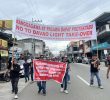MANILA — In her response to a survey that found the Philippines to be the most corrupt economy in Asia, President Gloria Macapagal-Arroyo claimed that the country�s negative image was an offshoot of tough decisions she made to turn the country around, such as the implementation of tax reforms like the RVAT.
But an examination of her six-year record in office showed that her government actually brought the country to its worst-ever fiscal crisis, according to independent think-tank IBON Foundation.
IBON research head Sonny Africa pointed out that total national government debt stands at P3.914 trillion as of October 2006, while total public sector debt (including debt of government corporations and other government entities) approaches P6 trillion, equivalent to some 110% of the gross domestic product. Africa added that these figures do not yet include contingent liabilities (or government-guaranteed debt) of P552.7 billion as of September 2006. The Arroyo government is the most indebted government in Philippine history, as well as among the most heavily indebted in East Asia.
Hence, total debt service allocations in the national budget have increased 186% from P274 billion in 2001 to P784 billion in just the first eleven months of last year, Africa said. In real terms (taking inflation and population growth into account), he added, every Filipino now owes the country�s creditors some P9,015.
Thus, Africa said that it should not be surprising that Arroyo was forced to implement the RVAT, the most regressive tax of all, which generated P76.9 billion in net revenues last year, mostly taken from the pockets of ordinary consumers.
But he added that Arroyo failed to point out that she also made drastic cuts in allocations for social services to make these high and rising debt payments. Real spending per capita on education of P1,506 in 2006 is 22% lower than in 2001, on health of a measly P159 is 25% lower, and on social security, welfare and employment of P532 is 9% lower, he said.
Government�s neglect of education, coupled with worsening economic and social conditions, means that millions of children are unable to obtain a decent schooling. Out of every 100 children who enter Grade 1, only 66% will finish elementary school, 43% high school and only 14% will graduate from college.
Further, in 2006 some 2.5 million children aged 5 to 17 were working either to augment family income or merely to survive. Over three-fourths of these children were working as laborers and unskilled workers in psychologically and physically hazardous conditions.
No amount of hype about economic gains can hide the worsening state of the people�s welfare under Arroyo�s, Africa said.
IBON Foundation, Inc. is an independent development institution established in 1978 that provides research, education, publications, information work and advocacy support on socioeconomic issues. (Ibon Features)








